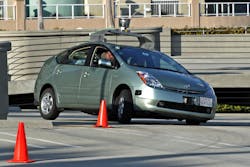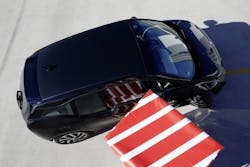Safety technology? Great. Self-driving technology? Not so much.
Re-insurance giant Munich Re recently conducted a survey among 1,001 U.S. drivers aged 65 and older regarding their view of new vehicle safety systems, such as backup cameras and automatic emergency braking (AEB) technology (though that’ll be standard in a few years) as well as self-driving cars.
The results: Such “older drivers” recognize the benefits of new vehicle safety technologies and are “comfortable” having them aboard. But they remain very reluctant to relinquishing total control to autonomous vehicle (AV) systems.
Yet does this view point matter, especially where trucking is concerned? I’d say it does for now as truck drivers as a population group continue to trend older by the day. But down the road, when millennials comprise the lion’s share of the workforce? I don’t think this “AV reluctance” will be much of a force by then – not in the least as it seems many millennials don’t like driving to begin with.
Still, the acceptance of so-called “active safety technology” by older drivers is a good thing as this is population with slower reaction times.
Indeed, drivers over age 65 are currently one of the fastest-growing demographic groups in the U.S. – they’ll number 40 million by 2020 – and are more susceptible to accidents given the challenges they face such as declining vision, decreased flexibility and slower reflexes, according to the National Highway Traffic Safety Administration (NHSTA).
“Active vehicle safety technology has the potential to reduce crashes in any age group, but may offer specific benefits for older drivers,” noted Mike Scrudato, head of the mobility domain at Munich Re’s U.S. division, within the firm’s report.“For example, the Insurance Institute for Highway Safety (IIHS) found that rear cameras had the biggest benefit for drivers age 70 and older, reducing the backup crash rate by 40%, compared with 15% for drivers younger than 70 years old.”
When Munich Re asked older drivers asked what they believe to be the greatest benefit of active safety features, nearly half (41%) of those polled cited improved safety of elderly drivers, maintaining their independence (19%) and reducing the “societal costs” resulting from vehicle crashes (13%).
As a result, Munich Re’s survey found that some two out of three (63%) drivers over age 65 intend to spec active safety technology with their next new vehicle purchase, with blind spot detectors (51%), a backup camera (43%) and AEB systems (31%) the most “sought after” safety features. And of those polled, about 44% said they would be willing to pay more for a vehicle with active safety features if the added cost is less than $5,000, Munich Re discerned.
Yet older drivers, like a goodly portion of other motorist demographics, remain reluctant to relinquish total control to a car’s internal systems. Nearly half (49%) of those Munich Re polled noted that they would be somewhat or very uncomfortable riding in a fully autonomous vehicle.
The survey found that the majority of older drivers (53%) would still prefer to drive themselves, even if ridesharing services were available at a reasonable cost.
Still, Munich Re’s Scrudato stressed that AV technology remains poised to “transform the U.S. transportation ecosystem” with a mix of what he called “opportunities” and “risk exposures” alike facing motorists, vehicle manufacturers, and government regulators alike – especially as to who or what is at fault when an AV crashes.
Getting all of that worked out is but the start.

